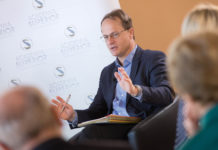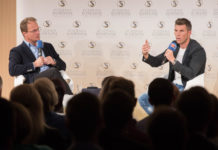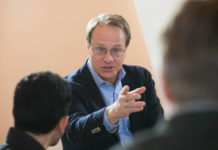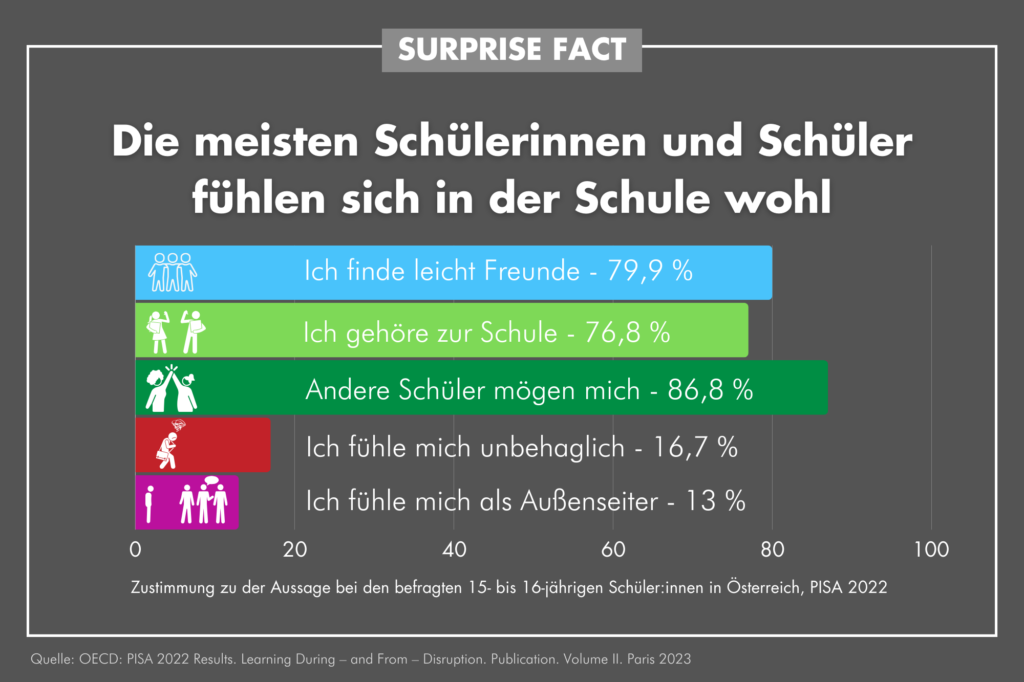ACADEMIA SUPERIOR DIALOGUE with Univ.-Prof. Dr. Markus Hengstschläger and Anas Schakfeh, the former president of the Islamic Community in Austria on May 2, 2012 in the south wing of Linz castle.
Anas Schakfeh was born in 1943 in Hama (Syria). For his studies of medicine and Arab at the University of Vienna he came to Austria in 1965 and became an Austrian citizen in 1980. From 1979 until 1989 Schakfeh worked as the director of an Arab language course for the Afro-Asian Institute in Vienna, later on he was also a high school teacher for Islam religion. Already in 1987 he was elected the president of the Islam Community in Vienna, Lower Austria and Burgenland. 1997 Schakfeh became the acting president of the Islam Community and from 2000 to 2007 the president of the Islam Community in Austria.
There is hardly another topic that has caused as much public uproar in the past years as integration. The reason is obvious: Integration affects us all.
Mag. Michael Strugl opened the dialogue by emphasizing the relevance of lived integration as the only viable option way for a peaceful coexistence. For two things are beyond dispute: First, migration is reality, and second, integration is an obligation for both parties. This means that both the majority population and immigrants need to actively work towards a common future. While a large proportion of the population understands foreign cultures as an enrichment of one’s own value system, there are also many people in this country who reject the issue of migration. These people are afraid. Therefore a responsible policy has to take the existing fears and concerns of the people seriously and make sure that a difficult topic like integration is not left to populist firebrands.
The number of Muslims in the EU is increasing. Reasons for this are big economic and political changes. People become more mobile, „we can speak of ‘mass migration’,” says Schakfeh.
„We date the world before September 11 and the world after”
Before September 11, 2001 there was basically a friendly atmosphere towads Muslims in Austria, there were no noteworthy problems or resistance. After 9–11 the world and especially the west became harsh and unfriendly, however not so much in Austria. However, after the bombings in London and Madrid, the climate became worse. „In Austria there were fears and concerns over these developments, however they were encountered rationally and objectively. Signals were sent to show that we are different, better,” the former president of the Islamic Community says. „In general, Europe has distanced itself from this radicalism and the European Conference of Imams positions itself against fundamentalism and terrorism again and again. The radicals are a small group. It is dangerous if someone without training with the texts of the Koran interprets them. Radicalism develop when theologically untrained people become muftis.”
Schakfeh’s take on the Arab Spring: „Religion and Islam are not an issue. People demonstrate for their freedom, equality, for social justice, against corruption and tyrannical forms of government from Kuwait to Tunisia. For me this is a natural and very positive development.”
On the role of women Schakfeh says that the cause lies not in Islam, but at the position of women in different societies and countries. He also notes that there was not a single woman in the federal government when he came to Austria.
Language as a key to integration
Markus Hengstschläger notes that the second generation of immigrants in Austria is partly less integrated than the first generation. For example 21% of Turkish women of teh second generation do not speak German. Schakfeh agrees that there is a language problem and that it has become worse. „People who do not speak German are not born here.” He sees the cause of the deterioration of German language knowledge in the social development of this group of people and in the access of modern information and communication technologies (satellite channels, Internet, etc.). Schakfeh pleads for an early intervention for children to make the language accessible to them and for schools with better trained teachers in this respect in order to improve the development. For Schakfeh language is a key to integration. „We have repeatedly pointed to the importance of language.”
Schakfeh welcomes the establishment of the State Secretariat for Integration, but notes that there is „impatience on both sides.” „Development takes time,” said Schakfeh.
„Mudslinging is no policy”
Demography is changing rapidly, which causes anxiety and uncertainty. „Hateful preachers will prove to be false prophets. Populist parties have no solutions, they talk bad about everything and are not constructive, this is no way to do politics. Still, whining and slogans find open ears, they play with repetitions and speak people’s emotions.” Answering the question of how to shape the integration of Muslims in Austria over the next 50 years, Schakfeh is optimistic: „The Austrian society will manage the future better than other peoples and societies.”
The former president of the Islam Community wants that politicians from traditional parties do not remain silent when populist spread their paroles, he wishes for ture integration instead of uniformation and investment in education and training.
As a final note, Anas Schakfeh sais that to be on good terms with your neighbors is of great importance in Islam. This is definitely something to build on.






